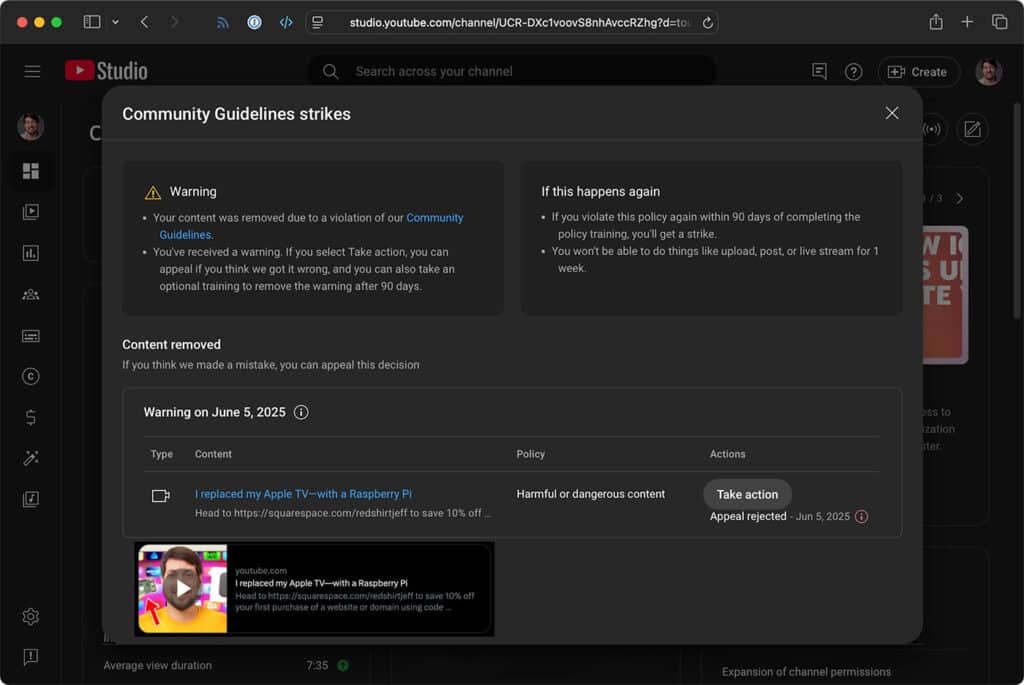Tech creator Jeff Geerling saw one of his videos on LibreELEC and the Raspberry Pi 5 removed by YouTube for allegedly violating its community guidelines. The video was later reinstated—but the incident highlights growing tensions between automated moderation systems and the open-source community.
YouTube is once again under scrutiny after taking down—and subsequently restoring—a video by well-known technologist Jeff Geerling. The video demonstrated how to use LibreELEC on a Raspberry Pi 5 to host a personal 4K media library. YouTube cited violations of its policies on “dangerous or harmful content,” claiming the video showed how to access paid media services for free.
Geerling, a long-time advocate for self-hosting and free software, denied any promotion of piracy or circumvention tools. “I’ve always purchased my own media—CDs, DVDs, Blu-Rays—and host them legally on my NAS,” he explained. “This was purely about self-hosting content I own.”
The video had been live for over a year, garnered more than a million views, and included no references to illegal downloads or copyright circumvention. Despite that, it was automatically flagged and removed, and only reinstated after social media outcry prompted what appeared to be a manual review by YouTube.
Is Self-Hosting “Harmful”?
This wasn’t Geerling’s first encounter with YouTube’s moderation system. In 2023, a tutorial on how to install Jellyfin—an open-source alternative to Plex—was also flagged. That strike was resolved within an hour after a successful appeal. This time, the resolution took longer, prompting concerns about overzealous AI moderation systems misclassifying educational content.
“The idea that hosting your own media library is dangerous or subversive is absurd,” said Geerling. He has since re-uploaded the video on platforms like Internet Archive and Floatplane, ensuring availability outside the Google ecosystem.
A Shrinking Space for Open Source
The case adds to growing frustration among the open-source and tech education communities, many of whom argue that YouTube’s policies disproportionately affect software freedom advocates. Critics suggest these restrictions inadvertently bolster corporate platforms by discouraging alternatives.
“Streaming services used to be convenient,” says Geerling, “but now they’re fragmented, ad-riddled, and full of friction. I prefer buying physical media and managing it myself.”
The Algorithm Rules All
While Geerling has started to upload part of his content archive to Floatplane and explored federated platforms like PeerTube, he admits the economics are tough. YouTube’s scale and AdSense model remain hard to replace for creators with families and full production schedules.
“Each tech video takes anywhere from 10 to 300 hours to produce,” he says. “And you can’t sustain that without stable income.”
Even more concerning, Google recently introduced AI-generated summaries on YouTube videos, raising suspicions that content like Geerling’s may be used to train AI models without consent.
Self-Hosting Under Threat?
At its core, the incident exposes how automated content moderation tends to flag any topic dealing with control over infrastructure or data. Tutorials about self-hosted media platforms, open-source privacy tools, or alternative networks often get caught in moderation nets designed to detect piracy or abuse—but with insufficient nuance.
Labeling open-source tutorials as “harmful” undermines educational content and threatens the very idea of user sovereignty on the web.
“Go Forth and Self-Host”
Despite the flagging, Geerling closed his statement with a defiant message: “Go forth, and self-host all the things!”—a rallying cry for the free software community to keep building and teaching, even in the face of algorithmic gatekeeping.
In an era where generative AI and centralized platforms dominate discourse, cases like this highlight the growing urgency to defend open, user-controlled systems. For developers, educators, and digital rights advocates alike, self-hosting isn’t just a technical choice—it’s a digital civil liberty.

